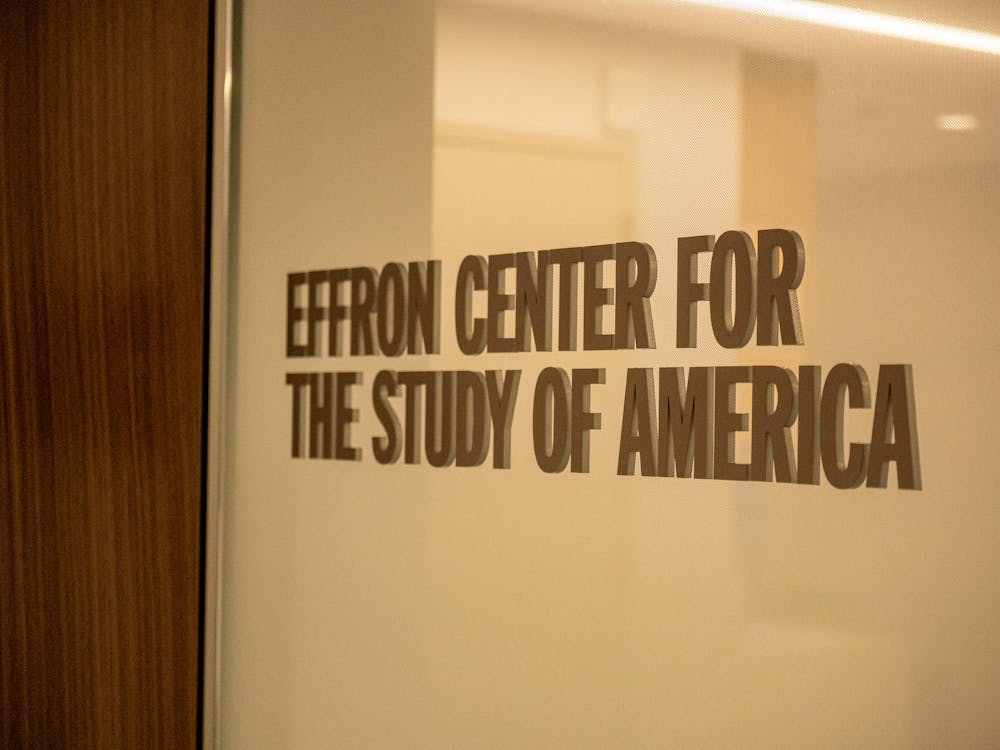In the Native Hawaiian culture, tī leaf leis are a symbol of protection and welcome. One of these leis was gifted to professor J. Kēhaulani Kauanui by Ila Nako ’26, a student leader in Natives at Princeton (NAP), and two other Native Hawaiian students when the anthropologist visited campus last October.
During her visit, Kauanui, a Native Hawaiian who teaches at Wesleyan University, gave a talk on Hawaiian decolonization and feminism. Coming this summer, she will assume the Eric and Wendy Schmidt Professor of Indigenous Studies position at Princeton.
“I found the students dynamic, invested, really sharp — they asked such important questions. There's a really exciting vibe,” Kauanui said in an interview with The Daily Princetonian.
The Board of Trustees approved Kauanui’s appointment to this position last month. Effective July 1, she will assume positions in both the Department of Anthropology and the Effron Center for the Study of America.
While this hire ends the search for the Indigenous Studies professorship, first announced in December 2020, it is only the beginning of a continued effort to build up Princeton’s Indigenous Studies program at Princeton.
Anthropology Professor Ikaika Ramones said of the students’ gift to Kauanui, “[Students] took time to gather together the day before and create something for her, by hand, with something that grew in the soil in Princeton.”
“I think that’s a pretty powerful symbolism of the potential of what can grow here,” he continued.
Growing Indigenous Studies Through the Effron Center
For the past several years, the Effron Center for the Study of America (previously the Program in American Studies) has housed several Indigenous Studies initiatives on campus. In 2020, the Effron Center funded the creation of a website for the Native American and Indigenous Studies Initiative at Princeton (NAISIP).
“To be in a space …where they’re bringing in cutting-edge researchers who are engaged in critical ethnic studies within an American Studies context, and [who] understand the importance of Indigenous Studies — that is something that really excites me,” Kauanui told the ‘Prince.’
Effron Center chair Professor Aisha Beliso-De Jesús also confirmed that Effron Center faculty are “working towards the launch of a minor in Indigenous Studies,” and that the University plans to “prioritize future faculty appointments across the university within this vital field.”
According to Beliso-De Jesús, the process of filling the Indigenous Studies professorship was “thoroughly collaborative” between the Dean of the Faculty and various academic units, along with engagement from students, faculty, alumni, and community stakeholders.

Last fall, representatives from NAP and Native Graduate Students of Princeton (NGSP) expressed that they felt “left in the dark” during previous attempts to fill the faculty position and did not have a formal role in the search committee.
“We’ve been more aware of everything this time, which has been so much better because it’s felt like we’ve both been involved in the process itself and also afterward we’ve been kept informed,” NGSP president Brandi Bushman GS told the ‘Prince.’
She added that Kauanui was particularly attentive to students’ interests during her visit.
“Kauanui was only here for a couple [of] days, but she really developed relationships with the Native Hawaiian students, specifically, and the Native community generally,” Bushman said.
Kauanui has taught in the American Studies and Anthropology departments at Wesleyan University since 2000 and founded the school’s Indigenous Studies Research Network. She also served on the steering committee, as an inaugural council member, and as a co-founder of the Native American and Indigenous Studies Association.
“She has really seen and helped build the field, not even nationally, but internationally,” Ramones said. When Kauanui came to visit, “it was like talking to someone who immediately already had her finger on the pulse and was just ready to get started,” he added.
Last fall, Bushman also told the ‘Prince’ that attracting professors to campus when Princeton does not yet have a full Indigenous Studies minor or department could prove difficult.
“The Native community, more generally, is small, but we’re very present, and we’re very active,” Bushman said. “I think [Kauanui] saw a community on campus that is wanting to get work done, wanting to collaborate, and wanting to build something. She’s such a builder.”
Collaboration Across Departments
In her conversation with the ‘Prince,’ Kauanui emphasized her desire to collaborate with existing Indigenous studies initiatives on campus, including NAISIP and the Princeton American Indian and Indigenous Studies Working Group (PAIISWG).
“She came with a boatload of expertise, but also a very attentive ear, which I think is a really good combination for something like this,” Ramones said.
“I know that there are other faculty across the campus who are interested and engaged in research pertaining to Indigenous peoples, and I’m really excited to be in conversation with them and to think about different initiatives that we might do together, whether it be workshops, conferencing, [or] research labs,” Kauanui said.
Specifically, she hopes to “do something bigger” with studies of global indigeneities and the LANDBACK movement.
Kauanui also mentioned several potential course offerings adapted from her work at Wesleyan, including Decolonizing Indigenous Gender and Sexuality, Indigenous Women and the Politics of Feminism, and a research course on the LANDBACK movement.
“The presence of the field on campus is just going to be much more of a thing than it’s been,” Bushman said. “In this past year, it’s already changed so much. It’s very exciting to know that it’s going to keep growing.”
“There’s a lot of potential and a lot of excitement,” Kauanui said.
Elisabeth Stewart is an assistant News editor for the ‘Prince.’
Please send any corrections to corrections[at]dailyprincetonian.com.








